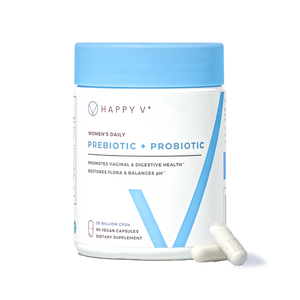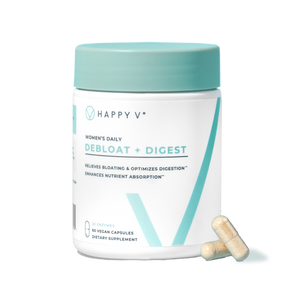- Fact Checked
- October 04, 2025
- 18 min read
What Causes Your Period to Be Late (Beyond Pregnancy)
Table of Contents
Table of Contents
It’s that time of the month again, but for some reason, your period doesn’t come. So, you wait a day or two, still nothing. Maybe you even take a pregnancy test, only to see a negative result. But still… no period. So what gives?
The truth is, pregnancy isn’t the only reason for a missed or late period. Stress, hormones, lifestyle changes, and even everyday factors like travel or sleep can all impact your cycle1. Many times, a late period is nothing to worry about. Other times, though, your body is trying to tell you something is wrong. After reading this article, you’ll know how to tell the difference and how to spot a healthier cycle.
This post is for informational purposes only and does not constitute medical advice. See full disclaimer below.
How Much Delay in Periods Is Normal?
Before we dive into what causes late or missed periods, let’s talk about what a late period even is. Believe it or not, there is an official definition.
Most healthcare providers consider a period to be late when it's 5 days or more past your expected date. Even if you consider your cycles to be super regular, most women experience at least one delayed cycle per year. If that’s you, there’s no cause for concern.
On the other hand, if you are experiencing irregular, delayed, or missed period more than 3 times a year or your period is more than a month late (and you’re not pregnant), it’s worth calling.
What Actually Causes Missed or Late Periods
Most people see the reproductive system as its own little bubble, but like all systems within your body, it’s deeply connected to your mental health, diet, and overall lifestyle. Here are the most common causes for missed or late periods that have nothing to do with pregnancy:
1. Stress
Your mental health has a tremendous effect on your physical health. If you’re experiencing a late or missed period, the first place to check is your stress level2.
When you're under significant stress (think: work deadlines, relationship conflicts, financial pressures, or major life changes like losing a job or a loved one), your body responds by producing higher levels of cortisol. Too much cortisol can disrupt the delicate balance of reproductive hormones3, particularly estrogen and progesterone, which regulate your menstrual cycle. This hormonal imbalance can:
- Delay or prevent ovulation
- Change the flow, length, and color of your period
- Increase blood sugar levels, which impact the timing of menstruation
If high stress levels tip over into depression, this can cause amenorrhea (aka the medical term for absent periods)4.
2. Birth Control and Hormonal Contraception
Many forms of birth control work by altering your hormone levels, which can lead to changes in your menstrual cycle5, include missed periods, lighter periods, or total amenorrhea. Often, these changes are intentional effects and don’t indicate a deeper health problem.
The most common types of birth control that affect your cycle include:
- Birth control pills: May cause lighter periods or even cause menstruation to stop entirely6
- Hormonal IUDs: Often lead to lighter periods or amenorrhea
- Depo-Provera injections: Many users stop having periods after several months of use7
- Implants: Can significantly reduce or eliminate menstruation
If you’ve recently stopped using birth control, this can also lead to cycle disruptions as your body’s natural hormone production resumes.
3. Medications
Beyond contraceptives, other medications can interfere with your menstrual cycle, with the most common being:
-
Antidepressants: Can affect hormone production and lead to irregular periods or amenorrhea
-
Antipsychotics: May increase prolactin levels, which can suppress menstruation
-
Chemotherapy drugs: Often cause temporary or permanent changes to menstruation
-
Thyroid medications: Improper dosing can lead to menstrual irregularities
- Blood thinners: Can affect the flow and timing of your period
If you've recently started a new medication and notice changes to your menstrual cycle, don't stop taking it without consulting your doctor. Instead, if you’re concerned, discuss the side effects with your doctor. They will help you determine whether a dose adjustment or alternative is needed.
4. Weight Changes and Body Weight
If you’ve lost or gained significant weight lately, that can throw off your period. That’s because your body weight and body fat percentage play a crucial role in hormone production.
When you lose a substantial amount of weight quickly or if your body fat drops too low, your body senses inadequate energy stores, and suppresses the hypothalamus, which regulates reproductive hormones. With the hypothalamus suppressed, you may not produce enough estrogen to maintain a regular menstrual cycle.
On the other hand, significant weight gain can also disrupt menstruation8. Excess body fat increases estrogen production, which can interfere with ovulation. Obesity is also associated with insulin resistance, which further complicates hormonal balance9.
5. Polycystic Ovary Syndrome (PCOS)
PCOS is one of the most common hormonal disorders affecting women of reproductive age and is a frequent cause of irregular periods10. At its core, PCOS involves hormonal imbalance, specifically too much androgen (aka male hormones), which can prevent ovulation.
There is no single test for PCOS11, but along with missed periods, many women also experience symptoms like:
- Ovarian cysts (fluid-filled follicles)12
- Excessive hair growth on the face and body13
- Difficulty with weight management
- Acne and skin issues
- Fertility challenges
While PCOS is a chronic condition, it can be managed with the help of an endocrinologist through a combination of lifestyle changes and medications.
You can read more about PCOS in our blog post here.
6. Thyroid Issues
Many people know that your thyroid regulates your metabolism14, but it also regulates hormone production throughout your body, including reproductive hormones.
Hyperthyroidism, or an overactive thyroid, causes your metabolism to speed but, which can lead to symptoms like:
- Lighter, shorter periods15
- Missed periods
- Longer gaps between cycles
- Difficulty conceiving
Hypothyroidism, or underactive thyroid, often comes with symptoms like:
- Heavier, longer periods16
- More frequent periods
- Irregular cycles
- Fatigue and weight gain17
If you're experiencing menstrual irregularities along with other symptoms like unexplained weight changes, fatigue, temperature sensitivity, or heart rate changes, ask your healthcare provider to check your thyroid function. Testing typically involves a simple blood test, and thyroid issues are manageable with medication.
7. Perimenopause and Menopause
As women approach their 40s and 50s, they enter perimenopause, or the transitional period before menopause when hormone levels begin to fluctuate. During perimenopause, you may experience irregular periods, skipped periods, or changes in flow, along with hot flashes, night sweats, and mood changes18.
This can go on for anywhere between 4-8 years. Once a woman has had 12 consecutive months without a period, she has transitioned from perimenopause to menopause.
Everyone with ovaries experiences this life transition at some point, so if you're in your 40s or early 50s and experiencing irregular periods, perimenopause/menopause is likely the cause.
8. Breastfeeding
If you've recently given birth and are breastfeeding, it's completely normal for your period to be delayed or absent19. The hormones involved in milk production, particularly prolactin, suppress ovulation and menstruation20. Some women don't get their period back until they stop breastfeeding entirely, while others may resume menstruation within a few months postpartum, especially if they're not exclusively breastfeeding.
9. Excessive Exercise
While regular exercise is beneficial for overall health and can help regulate your menstrual cycle, excessive physical activity, especially when combined with low body fat or inadequate calorie intake, can cause your period to stop altogether. This is common among elite athletes, dancers, and gymnasts because the stress of intense training can suppress the hypothalamus, leading to a condition called exercise-induced amenorrhea or athletic amenorrhea.
While not an unusual phenomenon, if you have been training intensely and your periods have stopped, it’s important to work with both your healthcare provider and a sports nutritionist to make sure you’re supporting your body’s needs.
10. Travel, Moving, and Major Life Changes
Believe it or not, changes to your routine or environment can affect your menstrual cycle. Many women report changes to their menstrual cycle after traveling or a big move. This is likely due to a combination of factors, including:
-
Stress levels: Because, let’s face it, moving is stressful, physically and emotionally
Time zone changes: Jet lag and disruption to your circadian rhythm can affect hormone production
- Diet changes: Eating different foods or at different times can temporarily impact your cycle
- Climate differences: New temperatures and humidity levels can impact your cycle until your body adjusts21
- Changes in routine: Sleep schedules, exercise patterns, and daily activities all affect hormone levels and production
- Altitude changes: Higher altitudes can temporarily disrupt your cycle as your body adjusts
Luckily, these effects are usually temporary, and your cycle will return to normal within 1-3 months as your body adapts. If it doesn’t check in with your healthcare provider.
11. Sleep Disruptions
Not getting enough quality sleep (think: 7-9 hours per night) can disrupt hormone levels and affect your menstrual cycle. If you’ve been doom-scrolling past midnight, waking up late, or struggling with insomnia, this can lead to stress and hormonal imbalance, ultimately affecting menstruation.
12. Illness
Being sick, especially with fever or a serious illness, can temporarily delay ovulation and, by default, your period. That’s because your body prioritizes fighting infection and recovering from illness over reproductive functions. Once you’ve recovered, your cycle should regulate again.
13. Primary Ovarian Insufficiency
Also known as premature ovarian failure, primary ovarian insufficiency (POI) occurs when the ovaries stop functioning normally before age 4022. This can cause irregular periods, missed periods, or complete cessation of menstruation, along with symptoms similar to menopause (hot flashes, night sweats, vaginal dryness)23.
POI is less common than other causes but if irregular and missed periods seem to be happening more often than not, this should be evaluated by a healthcare provider or endocrinologist, as it can affect fertility and overall health, including increased risk of heart disease and osteoporosis.
14. Other Health Conditions
As if all these reasons weren’t enough, other medical conditions can also impact your menstrual cycle, including:
- Diabetes: Poorly controlled blood sugar can lead to hormonal imbalances
- Celiac disease: Can interfere with nutrient absorption and hormone production
- Pituitary gland disorders: The pituitary controls reproductive hormones, so tumors or other issues can disrupt cycles
- Asherman's syndrome: Scarring of the uterus can prevent normal menstruation
What Does NOT Cause Missed or Late Periods
Now that we've covered the legitimate causes, let's address the many myths and misconceptions about what can delay your period. There are quite a few of these myths floating around, especially on the internet, and being able to spot them will save you from unnecessary worry and help you focus on the real health factors at play.
1. Drinking cold water.
Oddly enough, this is one of the most persistent myths about missed periods, but there is absolutely no scientific evidence that drinking cold water, ice water, or consuming cold foods can delay, stop, or affect your period—in any way.
Your body maintains a constant internal temperature (around 98.6°F or 37°C) regardless of what temperature water or food you consume. Even if you drink something super cold, the digestive system quickly brings it up to body temperature.
2. Drinking lemon juice, pineapple juice, or salt water.
This is another drinking myth with no merit. Your menstrual cycle is controlled by complex hormonal interactions involving the hypothalamus, pituitary gland, and ovaries—none of which are influenced by acidic beverages or salt water.
3. Eating papaya, pineapple, or other specific fruits.
While some people believe certain foods can trigger or delay menstruation, there's no scientific evidence to support these claims. If you have a late period due to hormonal issues, stress, or other medical conditions, eating specific foods won't override these factors. The belief likely stems from traditional medicine practices, but modern science hasn't validated these claims.
4. Eating spicy foods.
While eating spicy foods can cause digestive discomfort in some people, there’s no evidence that they impact your reproductive hormones or menstrual cycle. This means that spicy food cannot delay or trigger your period.
5. Consuming too much caffeine.
Excessive caffeine does not directly impact your period directly. However, excessive caffeine can increase your stress levels, which can affect your period. Drinking coffee or tea in normal amounts does not directly delay your period.
6. Air conditioning or cold weather.
Exposure to air conditioning or cold weather does not delay your period. Your body maintains its internal temperature regardless of external conditions. However, as we mentioned in the last section, if you’ve recently moved to a new climate (from the tropics to the Minnesota winter, for example), you may have cycle irregularities for the first few months as your body adapts. This isn’t due to the cold weather directly, but rather the adaptation stress. If you moved from the winter to the tropics, your body might experience similar irregularities for similar reasons.
7. Having sex.
The only way sexual activity can delay your period is if it results in pregnancy. Outside of that, no correlation between sex and the timing of your period.
8. Lifting heavy objects.
A single intense workout or lifting something heavy won't delay your period. But if you’ve excessively exercised for weeks or months and you have not had adequate calorie intake and/or very low body fat, this can disrupt your cycle. This is because the exercise is chronic, not a one-time activity.
9. Worrying about your period being late.
Worrying about a period being late won’t prevent it from coming. However, if you are a generally anxious or chronically stressed person, this could potentially affect future cycles.
10. Getting vaccinated.
While some people reported temporary menstrual changes after COVID-19 vaccination, research has shown these were generally short-term variations, not sustained delays. The simple truth is that vaccines do not contain ingredients that affect reproductive hormones. Any changes following the COVID-19 shot were likely due to the immune response (which is a stressor on the body) rather than a direct effect on the menstrual cycle, and most women's cycles returned to normal within one to two cycles.
11. Taking pain relievers like ibuprofen.
Over-the-counter pain medications like ibuprofen or acetaminophen do not delay your period. Ibuprofen can reduce menstrual flow and cramping once your period starts.
When to Seek Medical Advice
Like we said at the start, the occasional missed or delayed period is totally normal, and usually no cause for concern. However, it’s a good idea to contact your healthcare provider or OB/GYN regarding your cycle if:
- Your period is more than 6-8 weeks late and you're not pregnant
- You experience irregular periods three or more times per year
- Your period suddenly stops for three or more consecutive cycles
- You have severe pain, very heavy bleeding, or bleeding between periods
- You're experiencing symptoms of thyroid problems
- You have signs of PCOS
- You're concerned about fertility
- You're experiencing symptoms of perimenopause before age 40
- You have any concerning symptoms alongside your missed period (unexplained weight loss, excessive thirst, vision changes, severe headaches)
- You've recently lost a significant amount of weight or have very low body fat
- You suspect you might have an eating disorder
At the appointment, your healthcare provider can perform a physical exam, order blood tests to check hormone levels, and potentially conduct an ultrasound to evaluate your reproductive organs. Even if they do find something, early diagnosis and treatment of that “something” can prevent complications and help restore regular menstrual cycles.
Supporting Overall Cycle Health
While a missed or delayed cycle is normal, that doesn’t mean it isn’t super stressful! For many women, this can be the sign they need to give their body a little extra support. These are the best ways to support your menstrual health and prevent irregular periods from becoming a frequent occurrence.
1. Manage Stress Effectively
We’d said it once, and we’ll say it again: chronic stress is one of the most common disruptors of a healthy cycle. Supporting your mental and emotional well-being is essential, not only for your reproductive health but your overall wellness. For many women, this involves not only incorporating yoga, mindfulness, and nature time into their everyday routine, but also learning how to set boundaries to reduce work or relationship pressures.
2. Prioritize Sleep
Your body relies on rest to regulate hormones. Inconsistent sleep patterns can disrupt the signals that keep your cycle on track. Aim for 7–9 hours of quality sleep each night and try to keep a consistent bedtime and wake-up routine (yes, even on the weekends).
3. Focus on Balanced Nutrition & Movement
Food and activity both play major roles in reproductive health24. Support your body by:
- Eating a nutrient-dense diet rich in protein, healthy fats, whole grains, and colorful fruits and vegetables
- Avoiding extreme diets or skipping meals, which can stress the body
- Limiting excess caffeine and alcohol, which raise cortisol and throw off hormones
- Staying active with regular, moderate exercise, but avoiding overtraining that can suppress your cycle
4. Support Your Diet With Supplements
Certain vitamins and nutrients are especially important for cycle health, hormone balance, and ovarian support. If you struggle with hormone imbalance or menstrual regularities, consider supplements like:
- Vitamin D, which helps regulate reproductive hormones and supports overall hormonal balance25
- Folate, which supports cell health, fertility, and reproductive function
- Zinc, which is essential for ovulation and normal reproductive hormone signaling
- Myo-Inositol, which has been studied for its role in improving ovarian function, insulin sensitivity, and cycle regularity
Happy V’s Ovarian Support combines these powerhouse nutrients—along with other clinically studied ingredients like selenium, chromium, alpha lipoic acid, CoQ10–into one daily supplement, making it easier than ever to support your ovarian health.
5. Track Your Cycle
Period tracking is one of the simplest tools for uncovering the source of irregularities. By recording the first day of your period, along with symptoms (like cramps, mood swings, or spotting) and lifestyle factors (such as stress, sleep, or travel), you can start to see real patterns emerge—patterns you can take action on!
Beyond timing, consistent tracking also supports ovarian health by helping you:
- Identify whether you’re likely ovulating regularly
- Notice signs of hormonal imbalance sooner
- Understand how nutrition, stress, or weight changes affect your cycle
- Give your healthcare provider detailed insights for more accurate guidance
Every person’s body and cycle is a bit different, and over time, cycle tracking will help you recognize what’s truly “normal” for your body and what might need extra support.
Frequently Asked Questions
How many days late can a period be before I should worry?
If your period is more than 5-7 days late and you've ruled out pregnancy, monitor the situation closely. If it extends beyond two weeks, or if this becomes a recurring pattern (meaning it’s happening three or more times per year), contact your healthcare provider.
Can stress cause me to miss a period completely?
Absolutely. Severe or chronic stress can cause your period to stop altogether, for multiple cycles However, this typically requires sustained stress over weeks, not just a stressful day or two.
Will my period regulate itself, or do I need treatment?
This depends on the cause. If your late period is due to temporary stress or lifestyle factors (like travel or a brief illness), it may regulate on its own once those issues resolve. Root causes like PCOS, thyroid issues, or other hormonal imbalances typically require medical treatment to restore regular cycles.
Is it normal to be 1 month late?
If your period is a full month late and you've confirmed you're not pregnant, it's time to see your healthcare provider. Any delay beyond 6-8 weeks warrants medical evaluation.
Can I make my period come faster?
Nope. There's no scientifically proven way to immediately trigger your period (no matter what the internet tells you).
Final Thoughts
A late period when you aren’t pregnant isn’t always cause for alarm. Stress, lifestyle shifts, and hormonal changes are often to blame. Still, if irregularities happen often (more than 3 times a year) or last more than a month, it’s worth talking to your healthcare provider.
The best thing you can do is support your cycle daily by managing stress, getting quality sleep, eating well, and considering supplements like Happy V Ovarian Support. Tracking your cycle can also help you spot patterns and catch issues early, giving you clarity and peace of mind.
Keep the Conversation Going
- Visit our blog for more on BV treatment options and women’s health tips.
- Join our private Happy V Facebook group to hear from others who’ve been there.
- Explore supplements designed to support your vaginal health journey.
Disclaimer: This blog is for informational and educational purposes only and is not intended to diagnose, treat, cure, or prevent any disease. Statements about supplements have not been evaluated by the Food and Drug Administration. For more information about vaginal infections, visit the CDC or speak to a licensed healthcare provider.












